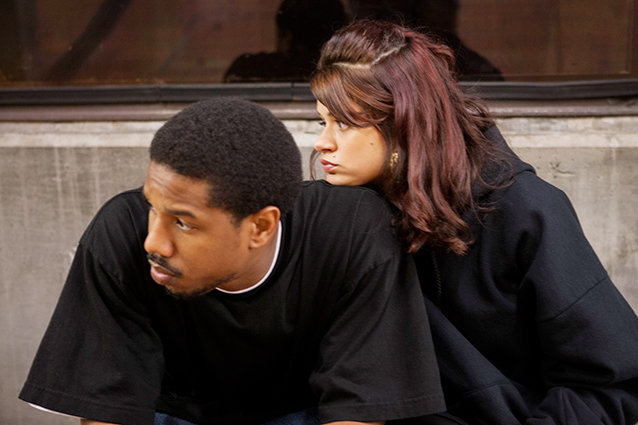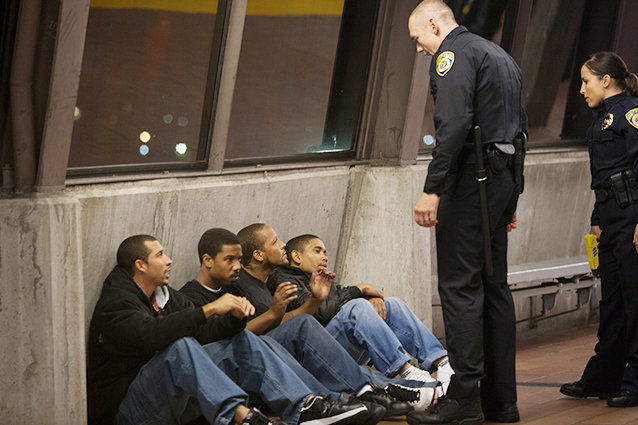
We are introduced to Fruitvale Station, a true story about an act of police brutality that resulted in the murder of California citizen Oscar Grant, with a found footage scene depicting the mortifying event in question. After the brief, static shot, it won’t be for another three acts that we return to the fateful train platform where Oscar — played by Michael B. Jordan with the sort of honest gravity that deserves Academy Award attention — endures the wrath of a team of Bay Area officers. As director Ryan Coogler explains in his interview with The Huffington Post, the positioning of the scene at the head of the movie, without any context or attachment to the characters, is meant to work as a juxtaposition to the climactic unraveling of events an hour and change later, after we have met, and come to love and hate, focal figure Oscar. But the introductory scene serves another purpose: establishing what this movie is, at its very core, about. Because otherwise, we would be thrown for a pretty jarring loop come the 80-minute mark.
Plotted throughout the meat of the movie are subdued suggestions of what is to come: Oscar’s felonious proclivities institute the dread of any presence of law enforcement; a flashback to his time in jail (one year prior to the events of the film) shows officers physically restraining him when he grows agitated and demands a hug from his tearful, disapproving mother. But Oscar’s experiences on December 31, 2008, could have quite easily served as a story entirely independent of the theme — a story about a 22-year-old struggling to evade old habits of drug peddling, reclaim the affection of his reluctant girlfriend, and start life anew with her and their young daughter. As we wade through Oscar’s day, finding ourselves affected by his victories and shortcomings alike, we almost wish the movie would never take that drastic turn. Not only out of affection for the character, but for the story: we grow so attached to Oscar that we want Fruitvale Station to be a movie about him. Not a movie about police brutality.

But the issue here is that Coogler set out to tell a story about police brutality — a very specific story, in fact. And when you look at the film from this angle, he actually approaches the task quite uniquely and effectively. Where many a movie with this didactic a message fails is in the absence of humanity: when you have a statement you are trying to make, you are wont to sacrifice fluidity and character, necessary elements to constructing a compelling movie. But Fruitvale is stocked to the brim with character. Oscar, and all of the people in his life, are gigantic, colorful, and tragic. We become so immersed in his world that by the time he is taken down by the Bay Area cops, we are not engaging as people sympathetic to the tragedy in theory, but as people wholly attached to Oscar as a human being.
As a character, Oscar is short-changed: the abrupt turn of events does not rectify or validate any element of his substantial arc, but explodes as a testament to the arbitrary injustice and cruelty of this world. If Coogler’s point is to highlight the delicate nature of life, he is successful. If it is to enrage his audience over issues of law enforcement tyranny, he is successful. If it is to provide a window into the sorrow felt by a family at the loss of the real Oscar Grant, he is successful. And we can bet that he did set out to accomplish each one of these tasks.
But while Fruitvale is no doubt an emotional, powerful, compelling film, a truly successful film on all fronts must abide by story structure. The film’s only failure is in that four fifths of the way through, it stops being a movie about one thing and becomes a movie about something else. It gives us a story about a young man so that it can then, in another effort entirely, give us a story about a tragedy. And, of course, when you’re handling real life material, this discussion is a delicate one. Coogler abandons Oscar’s personal narrative in exchange for the greater political and social question because that’s what the real story is. But in viewing the film as a piece of work all its own, it’s impossible not to acknowledge the artistic shortcoming of this avenue. Yes, the second story, arguably the more important story (at least to Coogler), is carried out effectively. But the first story is the one we’re left wondering about.
3.5/5
Follow Michael Arbeiter on Twitter @MichaelArbeiter | Follow hollywood.com on Twitter @hollywood_com
More:
‘Pacific Rim’ Review
‘Grown Ups 2’ Review
‘The Heat’ Review
From Our Partners Stars Pose Naked for ‘Allure’ (Celebuzz)
Stars Pose Naked for ‘Allure’ (Celebuzz) 20 Grisliest TV Deaths of 2012-2013 (Vulture)
20 Grisliest TV Deaths of 2012-2013 (Vulture)


